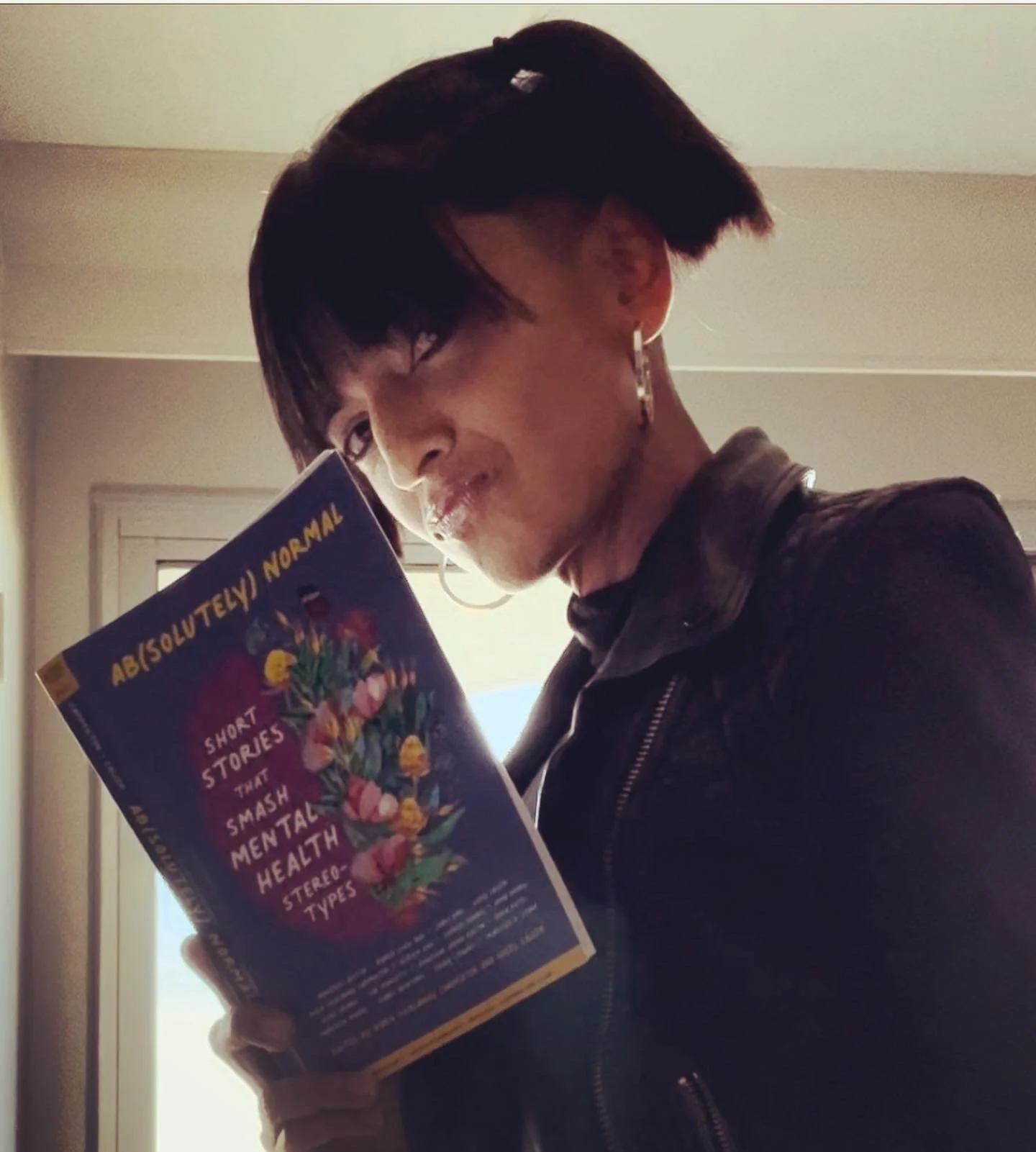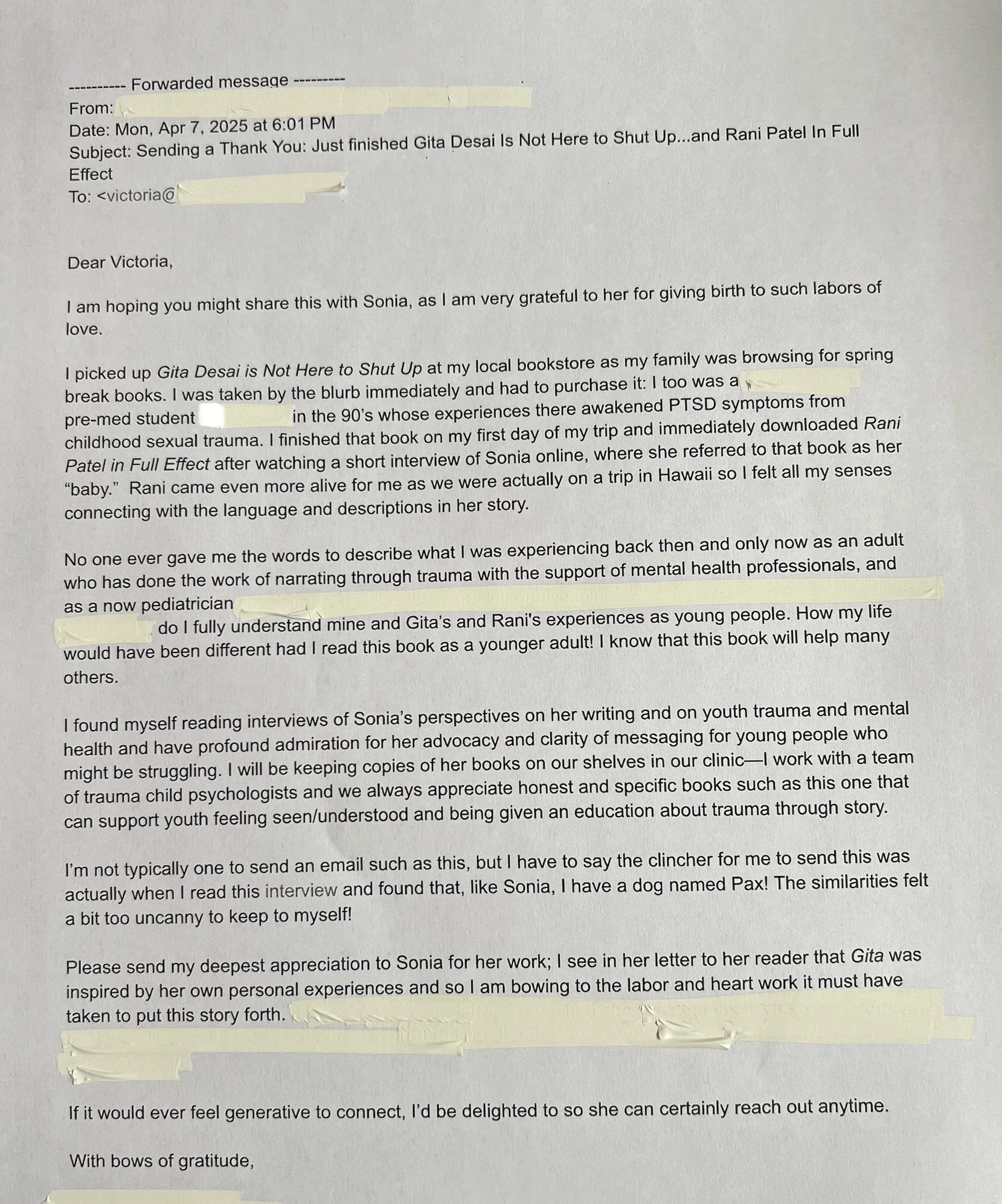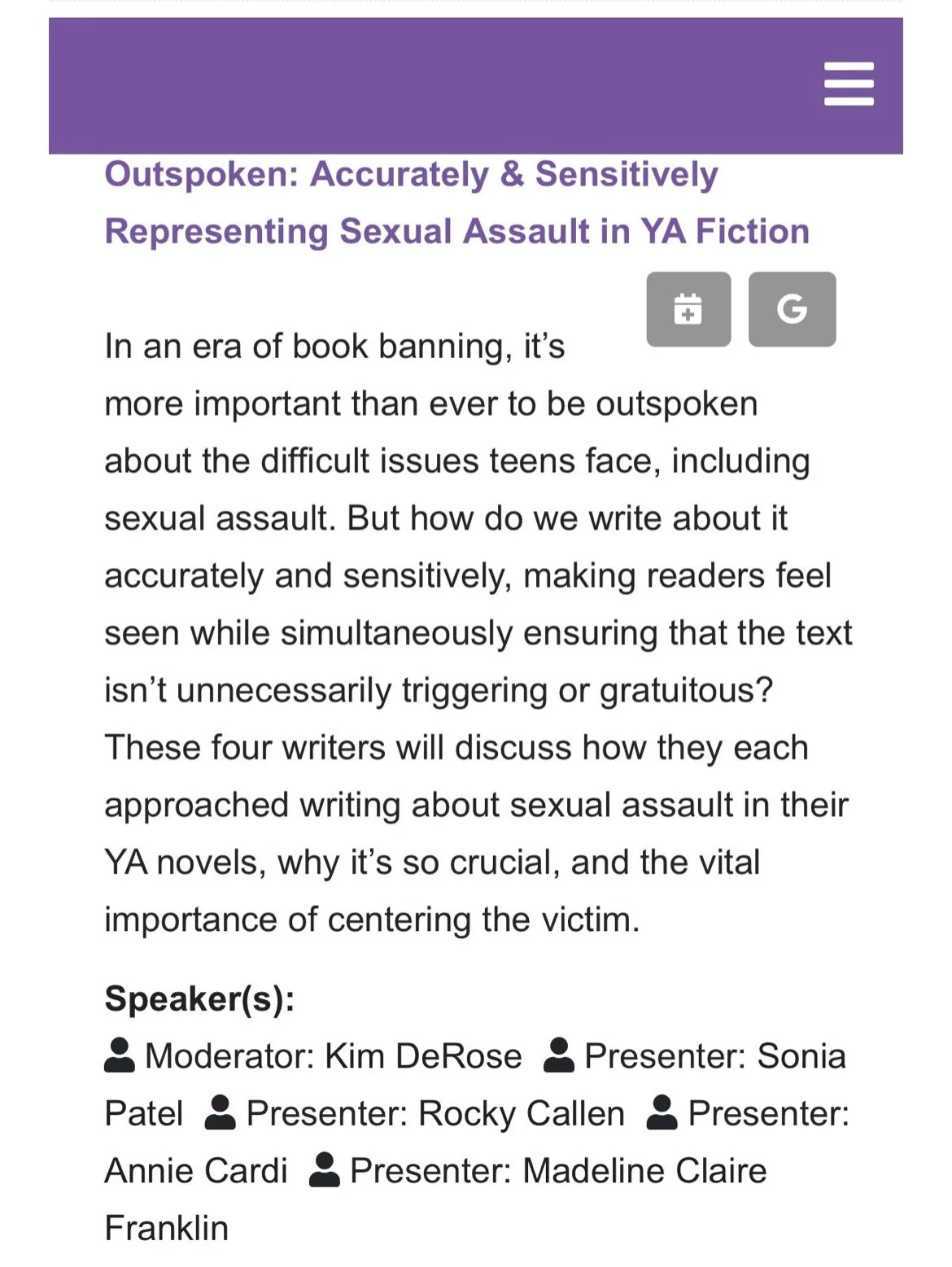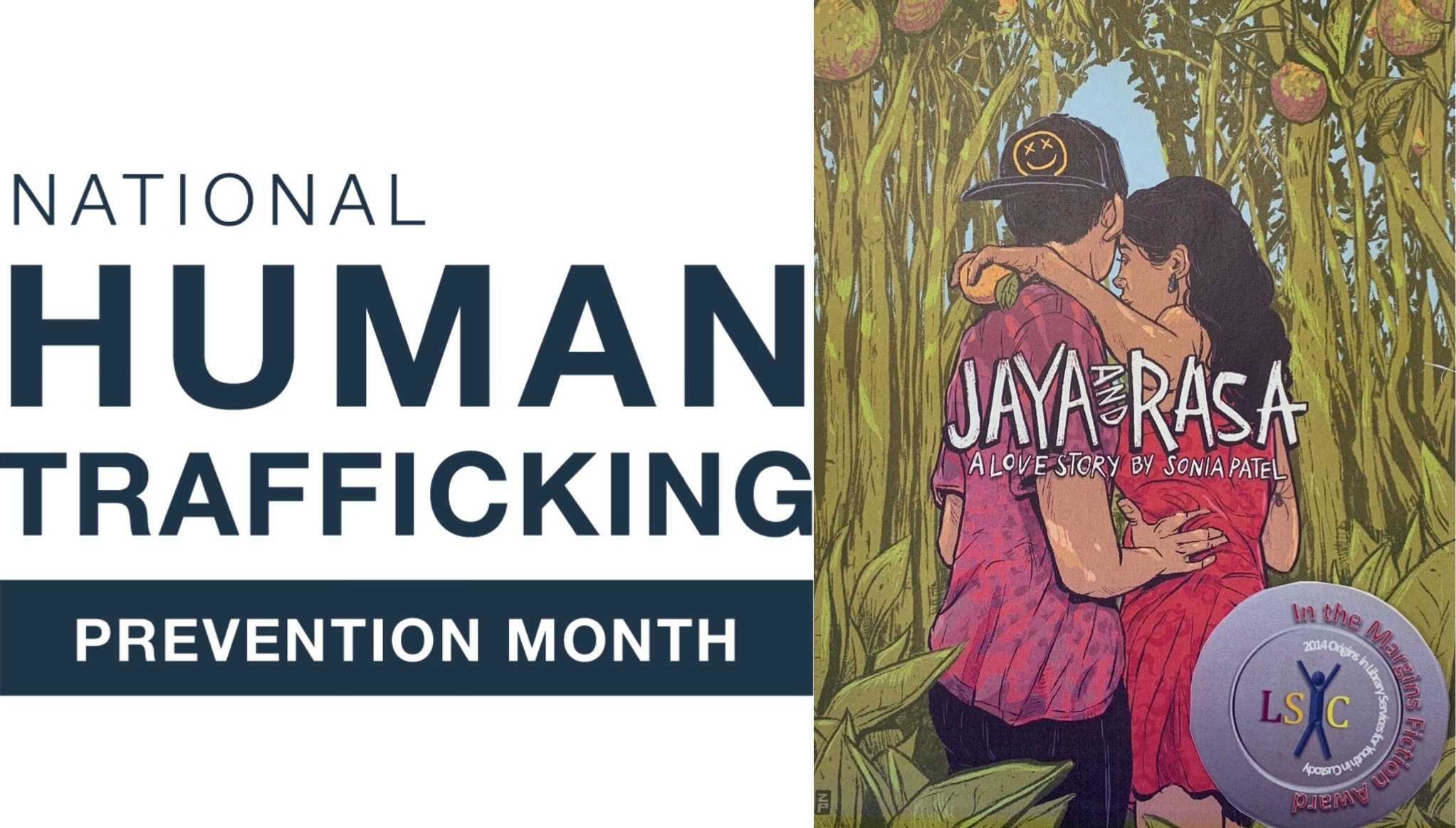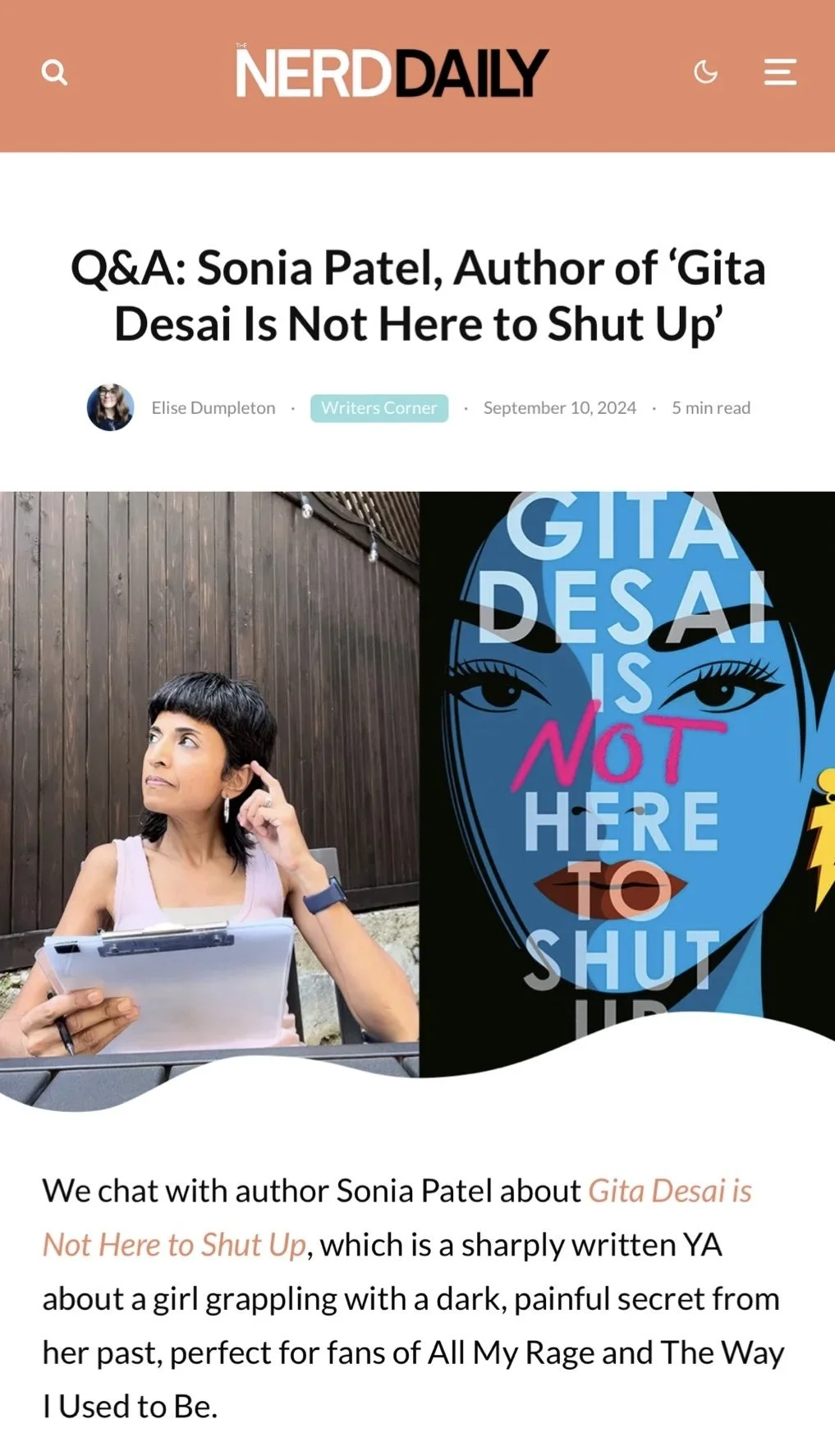young adults novels
My agent forwarded this to me today from a reader. It hit me hard. I am grateful and inspired.
Musing on the Upcoming AWP Panel--Outspoken: Accurately & Sensitively Representing Sexual Assault in YA Fiction
The panel discussion is on Saturday, and I began this morning with a cup of coffee and reflection: Growing up, survivors of chronic childhood incest (covert and/or overt) lack the language to conceptualize or relate what was done to them because survival demands their brains/bodies disconnect from their reality. Brain/body development and connection is damaged and pain is manifested as symptoms of suffering. It would be unrealistic to depict young survivors in YA lit as “obviously feminist” or able to ask for help or have insight. To do so would be dismissive and belittling of the vast complexities of the incest survivor experience—including the familial and societal enabling of it—and I refuse to be an enabler because I am a survivor.
Therefore, it makes sense to me to introduce myself at the panel like this: I’m Sonia Patel, and I’m a practicing child, adolescent, and adult psychiatrist. I’m the first person on both sides of my Gujarati-Indian family to be born in the USA, specifically New York. I was raised there, Connecticut, and the tiny island of Molokai, Hawaii, where my debut YA novel RANI PATEL IN FULL EFFECT is set. Rani’s story is my story, if I’d known what chronic covert and overt incest were while I was going through it—a completely different beast than circumscribed sexual assault in how fundamentally it damages brain development—and something that wasn’t, until RANI, depicted in YA literature in a way that I or many of the teens I treat could’ve related to or found comfort in. My latest YA novel, GITA DESAI IS NOT HERE TO SHUT UP, is my college story and is a realistic depiction of some of the possible long-term fallout of incest, such as the repetition of the sexual object role as a mute language of chronic incest, because the truth is most incest survivors lack the language to conceptualize or explain what was done to them in their youth and often cannot comprehend or verbalize about it until middle age. By giving language to the complexities of incest (the secrets, the gaslighting, the isolation, the denial, the enabling by other family members, and the patterns of negative thoughts, feelings, and behaviors), I hope to offer young survivors the “aha moments” never offered to me: the possibility of understanding that what they’re enduring is abuse and the acknowledgement and validation of their painful experiences. As a survivor and a psychiatrist who treats survivors, I’m well aware that healing is impossible without the aforementioned.
January is National Human Trafficking Prevention Month
“January is Human Trafficking Prevention Month, a presidentially designated observance that raises awareness about human trafficking and empowers the public to take action to prevent and respond to it.” –Office on Trafficking in Persons (U.S. Dept of Health & Human Services)
The character Rasa was inspired by one of my patients who found healing after being trafficked, but then died from an autoimmune disease—her body’s grief response. If I ever had the chance to give her JAYA AND RASA, I hope that she’d find the messy, inconvenient, and sometimes unpalatable story to be a realistic reflection of part of her life.
National Human Trafficking Hotline 24/7 Confidential 1-888-373-7888
Check out this TOOLKIT ON TRAFFICKING PREVENTION from the Office on Trafficking in Persons.
NERD DAILY INTERVIEW!
The full interview is here! Check it out!
YA BOOKS CENTRAL AUTHOR INTERVIEW
Honored to have been interviewed by YA Books Central! Check out the interview here!
HONORED THAT MY ESSAY IS INCLUDED IN THIS GROUNDBREAKING NEW ANTHOLOGY: JUST YA
AMAZING NEWS! A groundbreaking new YA anthology (grateful that my essay LETTER FROM YOUR NEW PSYCHIATRIST is included) will be live on September 2nd, and FREE off the Open OkState site. The paperback will eventually be available anywhere books are sold for the cost of printing and any bookseller mark-up. Thank you Sarah Donovon, editor, for your hard work and dedication on this incredible project!
From the introduction:
“JUST YA: SHORT POEMS, STORIES, & ESSAYS is a collection of open licensed,
non-revenue seeking literature about inclusive, affirming, justice-oriented
ways of being and the incredible capacity of youth.
The texts here are short so that they can be read and studied in one
class period. They are online so that teachers and students can freely print
and share the texts. Authors explore topics that can be in conversation
with/against canonical texts typically taught in high school classrooms.
This offers a rationale for teachers to bring in youth-focused texts to
update their curriculum and shift their framing with contemporary
perspectives. This collection is organized in themes around identity, love,
land, world, and futures (see Table 1.) that we see in conversation with the
required canonical texts and youth interests. And the forms are selected to
inspire student writing in a variety of forms, including creative fiction and
nonfiction.”
CHILDREN'S BOOK COUNCIL DIVERSITY NEWSLETTER, JULY 2019- I'M GRATEFUL FOR THIS INTERVIEW!
CHECK OUT THE HAWAII BOOK & MUSIC FESTIVAL! I’LL BE REPPIN’ YA LIT & MENTAL HEALTH ON 4 PANELS.
https://hawaiibookandmusicfestival.com/
SCHEDULE FOR SONIA PATEL:
Saturday, May 4
2:00pm
Imagining Other Places, Other Cultures
Sunday, May 5
12:00pm
1:00pm
2:00pm
IF YOU’RE GOING TO TAKE FROM MY CULTURE (YOGA), DON’T F&*@ IT UP!
Cultural appropriation is generally defined as the dominant culture stealing aspects of a minority culture, such as fashion, music, traditions, symbols, etc. It is often viewed as harmful, especially since it stems from colonialism and oppression.
Personally, I think the concept is taken too far sometimes. It’s not that I’m down with the disrespectful stealing of another’s culture, but I think the sharing of cultures can be beneficial. It can promote tolerance and empathy if done right.
I’m the first person in my Gujarati immigrant family to be born in America and honestly, there are times I feel Indian, times I don’t. There are times I feel American, times I don’t. And the culture I most identify with is hip hop culture, a culture born out of the black experience in New York City. Hip hop culture has influenced me in many positive ways and at times even saved my life. I’m thankful to hip hop, so much so that I gave it a central role in my debut young adult novel, Rani Patel In Full Effect. I intend no disrespect to the founding black culture, only gratitude. Hopefully, I succeeded in giving it the mad props it deserves.
I don’t relate to most aspects of my Gujarati Indian culture. But I do relate to yoga, a Hindu tradition that encompasses physical, mental, and spiritual practices. I focus on the physical and mental aspects in a Westernized way in a Western studio. For me, yoga, like hip hop, provides tremendous relief to the internal anguish that still plagues me given my family of origin issues. This, and because I’m a psychiatrist, I’m overjoyed that many people in the West practice yoga and find it helpful.
Not all Indians feel like that. There are Indians who consider westernized yoga to be harmfully appropriated, especially given the high commercialization of it and how far removed it’s become from ancient Indian philosophy and purpose.
More recently, I’ve felt the sting of this cultural appropriation in my yoga classes. But for me, it’s quite specific. Usually, I’m the only Indian person in class and when I hear practitioners, mostly women, talking about being on “detox juice cleanse diets,” “going vegan,” “deciding to quit all carbs,” or praising each other on weight loss, I feel angry. I mean do these people know that 15% of India’s population is undernourished? Do they know that most Indians in India are lacto-vegetarian? Do they know that it’s highly disrespectful when they talk about bodies like pieces of meat (which of course, they don’t eat)? Do they know that they’re perpetuating misogyny? I wonder if they talk to their children, especially their daughters, like that. More than angry, that makes me sad and scared for the future.
The worst was when a frequent practitioner began reeking of ketones during and after class. I know the smell from medical school and residency training and from my work with eating disordered patients. It’s not normal. Simply put, it represents the body breaking down. It can be dangerous, even fatal. It was common knowledge that this particular practitioner had been taking 3 classes a day. Every single day. Without eating in between. And not eating very much of anything all day. Personally, I found this to be the ultimate in disrespectful appropriation of yoga. I’m no expert on yoga philosophy, but I know for sure that it’s not meant to be harmful. And then how healing is it if a fellow practitioner dies in class because privilege allows them to take 3 classes a day and choose not to eat?
I expressed my concerns to the practitioner and the studio. I’m happy the studio made positive changes to their policies to assist practitioners in making more balanced, and less deadly, yoga choices.
I’m still all about sharing culture, but not about letting entitlement and privilege turn someone’s culture into something toxic.
